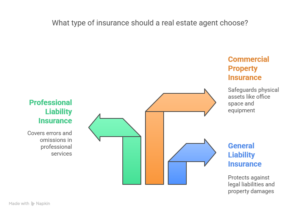Explore 7 must-have real estate agent insurance policies, including E&O, general liability, and more. Protect your business and clients effectively.
Introduction: Why Real Estate Agent Insurance Is Essential
Insurance for real estate agents is vital to safeguard agents in the field from a variety of risks and obligations. If you’re an independent broker or part of a brokerage company, getting the appropriate insurance policy will ensure that you are protected against any legal liability or property damages as well as others unexpected situations.

1. Errors and Omissions (E&O) Insurance
What Is E&O Insurance?
Errors and Omissions insurance often referred to as insurance for professional liability safeguards real estate professionals from accusations of negligent or insufficient job performance. This insurance is crucial because it covers mistakes and errors that may result in the loss of funds for clients.
Coverage Details
E&O insurance generally includes:
- Negligent advice or services
- The failure to reveal defect in the property
- Unauthorized disclosure
- Legal defense costs
If, for instance, an agent does not inform buyers about the property’s problems with the structure, resulting in an action in court, E&O insurance would cover costs for legal proceedings and possible settlements.
2. General Liability Insurance
Importance of General Liability
General liability insurance shields you from third-party lawsuits for bodily injuries or property damages that occur in the course of business. Agents who represent real estate, this is especially important when it comes to house showings and open houses.
What It Covers
This type of policy generally is applicable to:
- Injuries to customers or their guests
- Property damage caused by agent
- Advertising injuries like defamation
If, for instance, someone falls or trips in a tour of a home General liability insurance could pay for medical costs and legal expenses if the person is sued.
3. Workers’ Compensation Insurance
Why It’s Necessary
Workers’ compensation insurance is a must for real estate firms that employ employees. It is a way to cover the cost of medical bills and wages lost when an employee gets injured during the course of work.
Legal Requirements
In many countries that include areas of the United States, workers’ compensation is an essential legal obligation for employers that employ employees. The failure to adhere can lead to significant fines or sanctions.
4. Commercial Auto Insurance
Coverage for Business Vehicles
Commercial auto insurance protects vehicles employed for commercial purposes like showing homes or carrying customers. Personal auto policies usually do not cover incident involving business, thus making the insurance for commercial vehicles essential.
What It Includes
This type of policy generally is applicable to:
- Business vehicles
- Injuries to other vehicles or personal property
- For injuries resulting from a fall, medical expenses are incurred.
In the event that an agent was injured in a crash during the transportation of a client for a home showing commercial auto insurance will pay for the damage and medical cost.
5. Cyber Liability Insurance
Protecting Digital Assets
Cyber liability insurance is getting more important because the real estate industry involves confidential client data. It safeguards against data loss cyber-attacks, hacking, as well as other cyber-related threats.
Coverage Details
The insurance for cyber liability typically will cover:
- Data breach notification costs
- The legal costs associated with breach of data
- Business losses as a result of cyber attacks
If, for instance, the personal details of a customer are affected by an attack on their computer, the insurance will cover the cost in notifying the affected people and legal fees.
6. Business Interruption Insurance
Ensuring Business Continuity
Business interruption insurance covers for unforeseen events that disrupt regular business activities. Real estate agents are among the insured. it could be natural catastrophes or any other circumstances that hinder their business from operating.
What It Covers
The policy usually includes:
- Loss of income as a result of interruptions to business
- Operating expenses during downtime
- Costs of temporary relocation
In the case of the natural catastrophe damages your office, a business interruption insurance could cover expense of lost income as well as the cost incurred throughout the period of repair.
7. Property Insurance
Safeguarding Business Assets
Insurance for property protects assets like furniture, office equipment, and even documents, from threats such as theft, fire or vandalism. It is crucial to ensure that business operations are not affected by any financial loss.
Coverage Details
This type of policy generally is applicable to:
- Loss or damage to commercial property
- A burglary or theft
- The act of vandalism or another malicious crime
In the case of your office is burgled, and equipment was stolen, insurance on the property will cover expenses for replacement.
Comparison Table: Key Insurance Policies for Real Estate Agents
| Insurance Type | Coverage Focus | Typical Cost (Annual) | Legal Requirement |
|---|---|---|---|
| Errors & Omissions (E&O) | Errors, mistakes and negligence by professionals | $708 | State-specific variations vary. |
| General Liability | Property damage and bodily injury | $400 | No |
| Workers’ Compensation | Injuries and illnesses of employees | Varies | “Yes” (for employees) |
| Commercial Auto | Accidents involving vehicles for business and damage | Varies | No |
| Cyber Liability | Cyber threats and data breaches | Varies | No |
| Business Interruption | Income loss due to interruptions to business | Varies | No |
| Property Insurance | Office equipment and physical assets | Varies | No |
Frequently Asked Questions (FAQs) About Real Estate Agent Insurance
1. What kind of insurance do I require for a real estate broker?
For a real estate broker the most essential forms of insurance you need are Errors and Obligations (E&O) insurance, General Liability Insurance and Workers’ Compensation Insurance. Based on your particular situation, your business may require Commercial Auto Insurance, Cyber Liability Insurance, Business Interruption Insurance as well as Property Insurance.
2. How much will the insurance of a real estate agent cost?
The price of insurance for real estate agents is contingent on the where you are located, the kind of coverage and amount of business. In the average, E&O insurance cost about $700 a year and general liability insurance could cost around $400 annually. For policies that are more custom-made prices can go up when you add other coverages like commercial or cyber liability insurance.
3. Do I legally require real insurance for agents of real estate?
Although the requirements for insurance are contingent upon the location you are located in and whether or not you work with others, Errors and Omissions Insurance (E&O) is usually a legal requirement for real estate professionals. States such as California or New York, for example are requiring agents to carry E&O insurance to be legally operating.
4. Do I need insurance only myself? Or should I cover my employees as well?
In the case of an independent broker generally, you’re able to get individual insurance. But, if you operate an agency for real estate with staff, you could require Workers Compensation Insurance to ensure compliance with the state’s regulations. If this is the case there are group policies that your employees could be accessible.
5. What do Errors and Omissions (E&O) insurance cover?
E&O insurance typically covers the cases of negligence, insufficient quality of work, or mistakes made when you provide professional services. In the case, for example, you provide wrong advice to your client which results in a loss in financial value, the insurance is designed to cover the legal defense as well as any compensation or settlements awarded.
6. Are Cyber Liability Insurance necessary for real estate agents?
Yes! Real estate transactions now more and more rely on online platforms, the chance of cyberattacks and data breaches are higher than ever before. Cyber Liability Insurance guards against loss due to hackers, data breaches and identity theft. It is particularly important when you keep sensitive data of your clients on systems that are digital.
7. How can I determine what coverage I require?
The level of protection that you require will be contingent upon factors including how big your company as well as your risk profile and the value of properties you manage. The best practice is to talk with an insurance broker that specializes in real estate and will be able to evaluate the specific needs of your business.
Real Estate Agent Insurance Checklist: Don’t Miss These Coverage Types!
To ensure you’re covered in full to ensure that you are fully covered, we’ve put together a to ensure that you are fully covered, here’s a Estate Agent Insurance Checklist. You can use it to review your coverage at present and then complete any necessary policies you’re not aware of.
Essential Coverages for Real Estate Agents:
- Errors and Omissions (E&O) Insurance
It covers professional mistakes, negligence as well as failure to provide promises of services. - General Liability Insurance
It protects you from bodily injury or claims for property damage. - Workers’ Compensation Insurance
Insures employees for injury (only when you employ employees). - Commercial Auto Insurance
Vehicles employed for commercial purposes. - Cyber Liability Insurance
Guards against cyber-attacks and breach of data.
Optional Coverages to Consider:
- Business Interruption Insurance
In case your company is shuttered. - Property Insurance
Secures office equipment as well as physical assets from destruction or loss.
Key Facts & Figures
- 40 Percent of real estate professionals have reported having to deal with an issue with the law throughout their careers, highlighting the necessity of E&O assurance (National Association of Realtors).
- General Liability Insurance is as low as $400 per year to insure, which is a low cost in comparison to possibility of legal fees arising that could result from the possibility of a lawsuit.
- In some states, such as California in California, real estate agents must be covered by Errors and Obligations (E&O) coverage in order to keep their license.
External Resources
To learn more about what to consider when choosing the best insurance policy for your real estate company for more advice, please visit the Insurance for Real Estate Agents | National Association of Realtors.
The Bottom Line: Protect Your Real Estate Future by securing the appropriate insurance
Insurance for agents in the real estate industry isn’t just for protection, it’s an effective tool to protect your business, your clients and also your financial stability. It’s a job where unexpected problems like injuries, lawsuits on property visits as well as cyberattacks may be a problem, insurance can give the peace of mind you need and you can concentrate on the most important things: expanding your business and serving your clients in assurance.
When you select the best insurance plan, you’re not just meeting industry and legal standards but also showing your clients and colleagues that you’re a trustworthy and reliable professional.
In today’s highly competitive real estate market, having solid insurance isn’t an option but essential. It should be a part of your plan for business, and not something you think of as an added expense.


